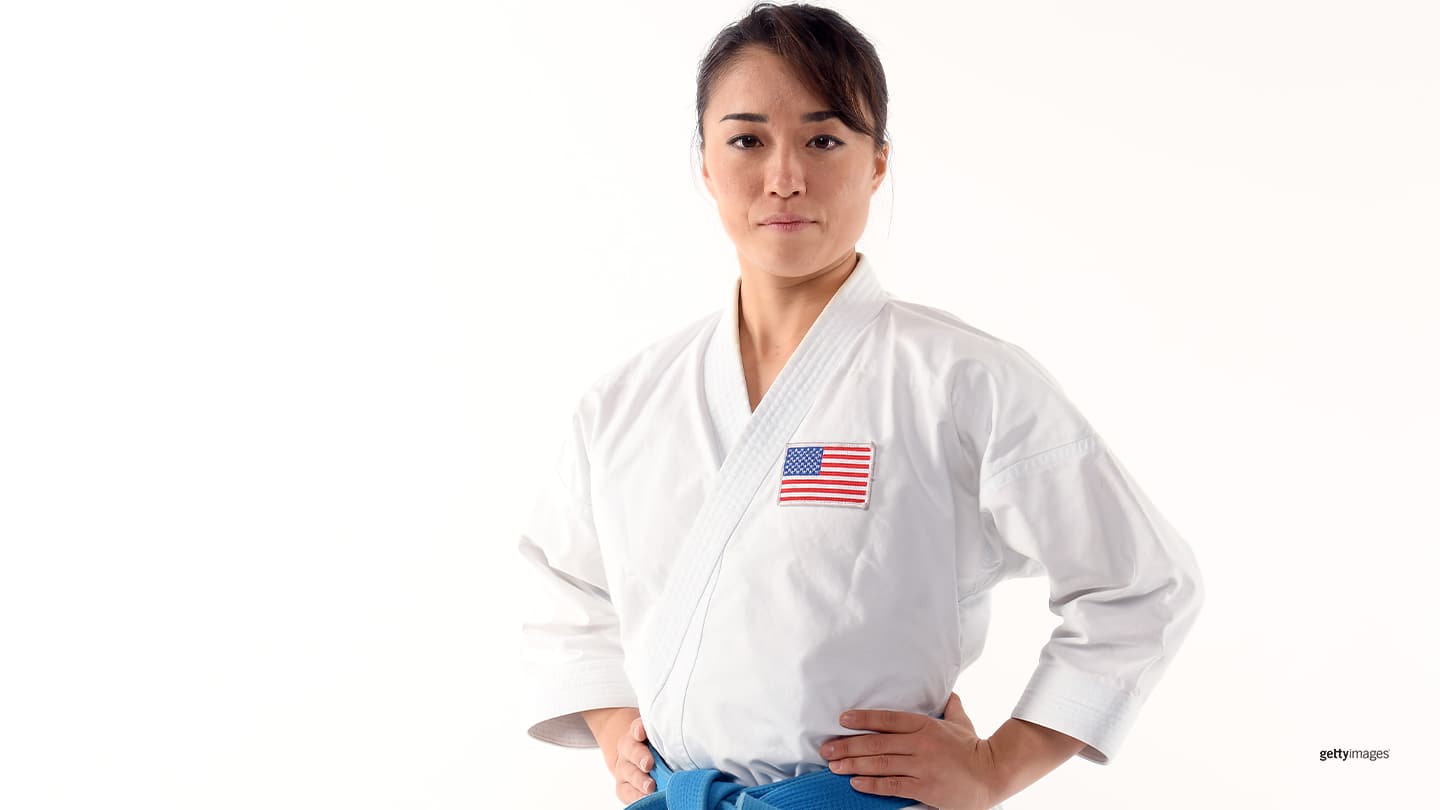
USA Karate’s Sakura Kokumai: My Experience With Anti-Asian Hate
by Sakura Kokumai

Sakura Kokumai poses for a portrait during the Team USA Tokyo 2020 Olympic shoot on Nov. 22, 2019 in West Hollywood, Calif.
A month ago, a guy at a park in California verbally harassed me because of my race. I am still processing. It was my first experience with such an aggressive and obvious hate crime.
I was a target because of how I looked. Not because I am an athlete. Not because I compete in karate — but because I am Asian. And no matter how you look at me, I will always look Asian.
It’s why with karate, I try to put all my energy into training — because I want people to recognize me for who I am, not how I look.
I felt like I had a lot to prove growing up. I did that with my actions and not my words. I was never very good with words, but karate helped me express myself through my art form.
Karate has helped me to keep my emotions in check. It allowed me to keep out all the noise and just do my job. It was my escape, my safe place. Something I always knew I could fall back on.
I think that’s why people love martial arts, because it’s a performance. It’s not just about going out there and winning. It’s about working on yourself and that mindset. I believe that’s what helped me in the park that day.
Before my incident, I was aware of everything going on with Asian hate. I had multiple conversations with my friends about it. But unfortunately, I had to experience it to really understand. It put it into context for me, and made me want to spread awareness by speaking out. Even though, normally, I’m the type of person who likes to keep things private.
I wish there was one thing that would fix this problem, but the first step is spreading awareness. And then we have to have empathy and compassion for one another. Over time we can help change things in the world for the better.
That was one of the lessons that I learned from karate: do better, be better. The learning process is never ending. I think that mindset is very valuable, no matter your age or what stage of life you are in. I take karate with me, wherever I go and in whatever I do.
As a Japanese American who was born and raised in Hawaii, I have always considered the United States my home. Hawaii is where I learned karate when I was seven. The U.S. is the country I have competed for since I was 14. But Japan is where my family is from.
I understand that it is confusing for people. It was confusing for me, too, trying to figure out where I belonged.
Growing up, we went back and forth between the two places a lot — I went to high school in Hawaii and Japan. It was important in our family for us to experience both cultures.
I trained karate in both places. It was the one thing that was the same in both places. It’s what kept me grounded when I was traveling back and forth between two countries.
It was like my protective bubble filled with things that looked like me, and acted like me.
With Hawaii being a very Asian-dominant place, I was always around strong female Asian American athletes. I tried to follow in their footsteps, and they accepted me for who I was. I felt like myself there, and it was where I got my first sense of belonging.
But later on in life, where I belonged would come into question a lot.
I decided to move to Japan to complete my undergraduate and masters degrees. While there, I was able to focus on my academics while getting amazing training. (Karate in Japan is looked at like football or basketball in the U.S.)
Every time I would fly out for a karate competition, I would have to explain why I was competing for the red, white and blue. But aren’t you Japanese someone would ask? The comments were subtle, but the jokes that followed were not. “Oh okay, we won’t cheer for you then if you’re representing Team USA,” they laughed. But it wasn’t funny to me, because I am Japanese. I have always identified as Japanese American.
After the hate crime I experienced went viral in Japan, a lot of Japanese people reached out to me — and that meant a lot. It’s also how my family first found out about it. That was a fail!
The Japanese national head coach in karate also called me asking if I was okay, and telling me he was rooting for me. He reminded me that the Olympics were fast approaching and he hoped I was training hard.
The support I received, no matter how small, was a big deal for the kid who grew up feeling like she didn’t belong in Japan.
And now to be able to go back to Tokyo to compete in kata in the Olympics — to represent the United States in a sport that originated in Japan — it’s a very special thing. I have a lot of people in Japan and in the U.S. who are rooting for me, and I want to show up and do what I do best. It’s something that makes me proud to be Japanese American.